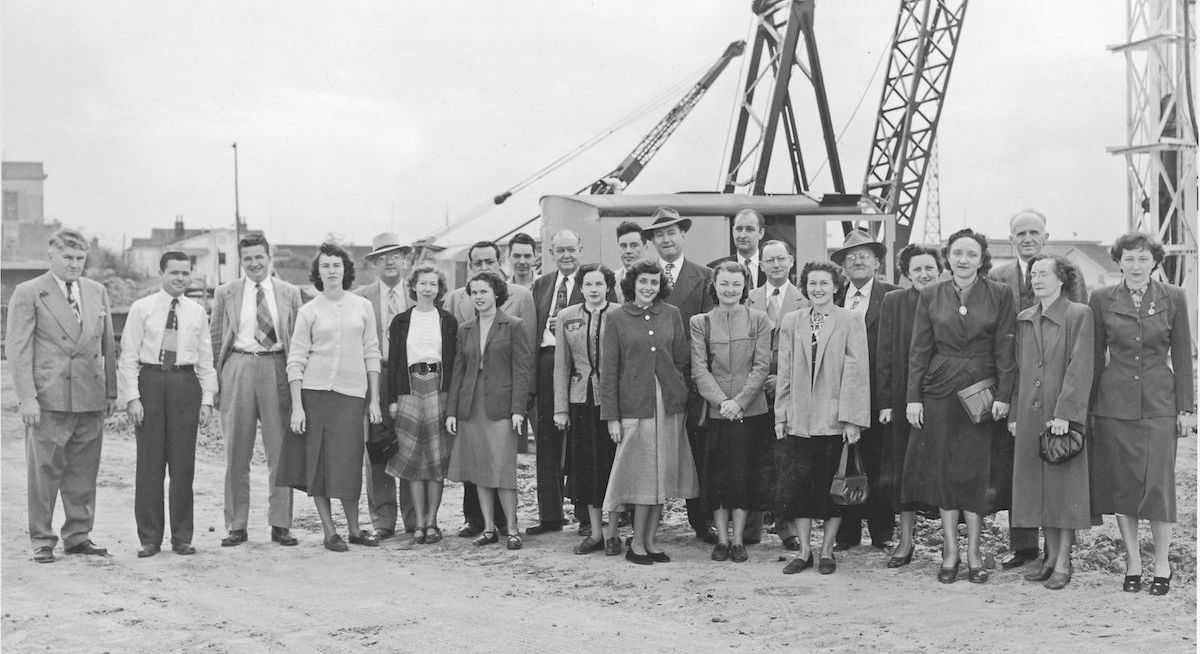Most family businesses don’t survive their second generation of leadership. The Beach Company, Charleston, S. C., is proof that ancestral enterprises can prosper.
Led by President and CEO John C. L. Darby, grandson of founder John Charles “J. C.” Long, the 72-year-old firm has built an impressive legacy as a real estate broker, developer, and property manager throughout South Carolina. With 308 employees, The Beach Company has a growing presence in the Southeast U.S.
Long, who captained the football team at the University of South Carolina, was a prominent personal injury lawyer in Charleston (he brought the state’s first asbestos case) and political figure (he served as a state senator and city alderman). Long formed the company in 1945, shortly after purchasing 1,300 acres on what he later named the Isle of Palms, a barrier island on the South Carolina coast. Inspired by the scenic locale, he chose “The Beach Company” as the business entity’s name.
Long started out developing the island to house soldiers returning from World War II. He kept expanding his real estate holdings, eventually becoming the largest property owner in Charleston County.
 John C. L. Darby and Charles S. Way, Jr., pore over blueprints, about 1990.
John C. L. Darby and Charles S. Way, Jr., pore over blueprints, about 1990.
In the 1970s, illness prompted Long to pass the baton to his son-in-law, real estate lawyer Charles S. Way, Jr. Way led The Beach Company until 1999, when he tapped Darby as his successor. Way continues to be actively involved in the firm as Chairman of the Board.
Since taking the reins, Darby has restructured the company’s Board of Directors to where the majority are not family members. “We’re a family company, but we operate much like a public company—very disciplined and focused,” he says.
A few fourth-generation family members currently work at The Beach Company, but they’ve had to earn their positions like everyone else. “It’s probably more difficult for a family member to get hired than it is for a nonfamily member,” Darby says.
DOUBLING DOWN ON MULTIFAMILY
Over the years, The Beach Company built up a diverse portfolio that encompassed office, retail, mixed-use, and other commercial real estate endeavors. “I used to say, we own everything in real estate—from cemeteries to fishing piers,” says the 79-year-old Way. “Well, we sold the fishing pier, but we still own a few cemeteries.”
In the past decade, the company has tuned its focus to its core multifamily business, notably apartment communities and mixed-use developments. From this foundation, The Beach Company is charting a measured, steady expansion into other mid-size growth markets in the Southeast—Columbia and elsewhere in South Carolina, and Chattanooga and Nashville, Tenn.
In the Music City, two new Beach Company multifamily developments are under construction. In the booming SoBro neighborhood, the Sixth & Lea project will feature 250 rental units and 5,400 sf of commercial space. In West Nashville, the 402-unit Bells Bluff apartment complex is situated on the banks of the scenic Cumberland River.
 Alberta Long serves coffee to her husband, J. C., in one of the early custom-made “mobile offices” the company used for site visits to remote projects.
Alberta Long serves coffee to her husband, J. C., in one of the early custom-made “mobile offices” the company used for site visits to remote projects.
The distinctive design of each property is a Beach Company hallmark. “We don’t repeat the same design from one project to the next,” says Daniel J. Doyle, Senior Vice President of Development. “Everything is customized to its site and community.”
This policy fits in with The Beach Company’s philosophy to take the long view of development. “Our attitude is that once a project is built, it’s a public asset,” says Darby. “People live there, work there, and shop there. That’s something we never lose sight of.”
OVERCOMING ITS SHARE OF OBSTACLES
It hasn’t always been smooth sailing for The Beach Company. In the course of seven decades, the company has had to struggle through numerous economic downturns and recessions. Yet the firm has never defaulted on a mortgage. Nor has it ever failed to deliver at least a reasonable return on investment to its joint venture partners. “Not many folks can say that,” says Darby.
The company has also had to negotiate with various contingents of Charleston citizens who, in their zeal to preserve the city’s charm and historic provenance, have opposed some of the firm’s plans.
For years, The Beach Company has faced opposition to its plan to redevelop the Sergeant Jasper apartment building—the company’s first mixed-use residential development, completed in 1950.
When Charleston’s Board of Architectural Review denied The Beach Company’s redevelopment proposal, in 2015, the company pursued—and ultimately won—a legal appeal that paved the way for The Jasper to finally get going later this year. Positioned on four acres at the entry to Charleston’s historic district, the new 12-story building will offer 218 residential units, 75,000 sf of Class AA A office space, and a mix of retail and dining options.
Doyle says the company remains committed to responsible development that preserves the city’s history while supporting Charleston’s explosive population growth—about 15,000 a year. Economists project that more than 20,000 new jobs will be created in the region over the next two years.
“People will continue to move here, and we need to accommodate that growth and make sure Charleston remains a livable city that will continue to prosper,” Doyle says.
EMBRACING THE COMMUNITY
The Beach Company’s positive impact on the community extends far beyond its real estate enterprises. Many of Charleston’s most treasured community assets were established by family members.
Darby’s father, pediatrician Charles P. Darby, Jr., MD, founded the Medical University of South Carolina Children’s Hospital. Darby’s sister, Ann Darby Parker, established the Children’s Museum of the Lowcountry. Way, who served as the Palmetto State’s Secretary of Commerce from 1999 to 2002, is Chairman of the Board of Trustees at South Carolina State University, a historically black college.
 McMillan Pazdan Smith (architect) and Seamon Whiteside (CE, landscape architect) led the design of Main and Stone, in downtown Greenville, S. C., a mixed-use development of 292 apartment units and 20,800 sf of retail/commercial space. The new “urban epicenter” connects three of Greenville’s Historic District neighborhoods in the fashionable North Main area. Greenville, once known as the Textile Capital of the World, is home to the North American headquarters of Michelin.
McMillan Pazdan Smith (architect) and Seamon Whiteside (CE, landscape architect) led the design of Main and Stone, in downtown Greenville, S. C., a mixed-use development of 292 apartment units and 20,800 sf of retail/commercial space. The new “urban epicenter” connects three of Greenville’s Historic District neighborhoods in the fashionable North Main area. Greenville, once known as the Textile Capital of the World, is home to the North American headquarters of Michelin.
“One of the things passed on from generation to generation is the idea of serving your community—whether it’s healthcare, education, the arts, or economic development,” says Darby. “We’re known as much for those activities as we are for our development work.”
Darby and his fellow third-generation family members (known as “the G3s”) are committed to ensuring that the family’s history and legacy are embraced by all staff members. It’s a responsibility he believes is crucial to The Beach Company’s enduring success—and a fitting tribute to founder J. C. Long, who died in 1984.
“I think J. C. would be very pleased that family members are so proud of their affiliation with the company,” Darby says.
Related Stories
MFPRO+ New Projects | Apr 16, 2024
Marvel-designed Gowanus Green will offer 955 affordable rental units in Brooklyn
The community consists of approximately 955 units of 100% affordable housing, 28,000 sf of neighborhood service retail and community space, a site for a new public school, and a new 1.5-acre public park.
MFPRO+ News | Apr 15, 2024
Two multifamily management firms merge together
MEB Management Services, a Phoenix-based multifamily management company, and Weller Management, a third-party property management and consulting company, officially merged to become Bryten Real Estate Partners—creating a nationally recognized management company.
Mixed-Use | Apr 13, 2024
Former industrial marina gets adaptive reuse treatment
At its core, adaptive reuse is an active reimagining of the built environment in ways that serve the communities who use it. Successful adaptive reuse uncovers the latent potential in a place and uses it to meet people’s present needs.
MFPRO+ News | Apr 12, 2024
Legal cannabis has cities grappling with odor complaints
Relaxed pot laws have led to a backlash of complaints linked to the odor emitted from smoking and vaping. To date, 24 states have legalized or decriminalized marijuana and several others have made it available for medicinal use.
MFPRO+ News | Apr 10, 2024
5 key design trends shaping tomorrow’s rental apartments
The multifamily landscape is ever-evolving as changing demographics, health concerns, and work patterns shape what tenants are looking for in their next home.
Mixed-Use | Apr 9, 2024
A surging master-planned community in Utah gets its own entertainment district
Since its construction began two decades ago, Daybreak, the 4,100-acre master-planned community in South Jordan, Utah, has been a catalyst and model for regional growth. The latest addition is a 200-acre mixed-use entertainment district that will serve as a walkable and bikeable neighborhood within the community, anchored by a minor-league baseball park and a cinema/entertainment complex.
Multifamily Housing | Apr 9, 2024
March reports record gains in multifamily rent growth in 20 months
Asking rents for multifamily units increased $8 during the month to $1,721; year-over-year growth grew 30 basis points to 0.9 percent—a normal seasonal growth pattern according to Yardi Matrix.
Industry Research | Apr 4, 2024
Expenses per multifamily unit reach $8,950 nationally
Overall expenses per multifamily unit rose to $8,950, a 7.1% increase year-over-year (YOY) as of January 2024, according to an examination of more than 20,000 properties analyzed by Yardi Matrix.
Affordable Housing | Apr 1, 2024
Biden Administration considers ways to influence local housing regulations
The Biden Administration is considering how to spur more affordable housing construction with strategies to influence reform of local housing regulations.
Affordable Housing | Apr 1, 2024
Chicago voters nix ‘mansion tax’ to fund efforts to reduce homelessness
Chicago voters in March rejected a proposed “mansion tax” that would have funded efforts to reduce homelessness in the city.

















